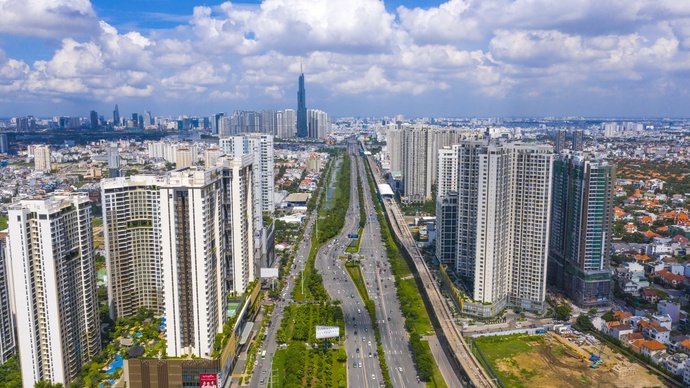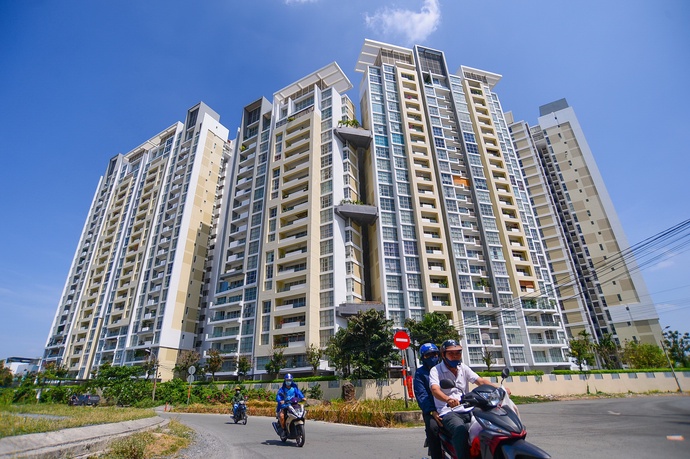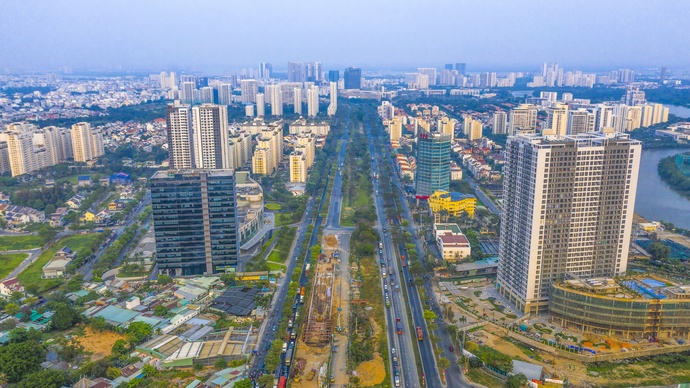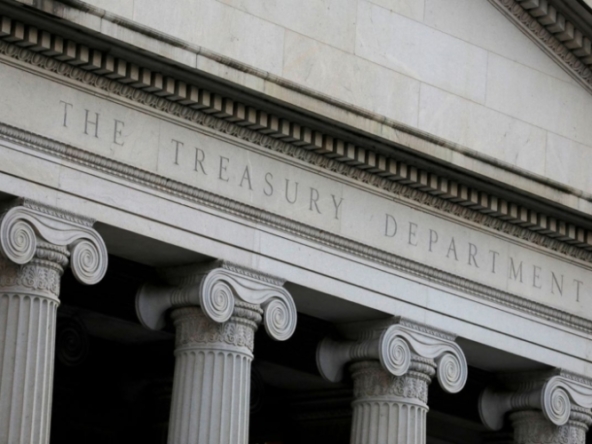The COVID-19 pandemic has left the city's residential leasing industry stagnant
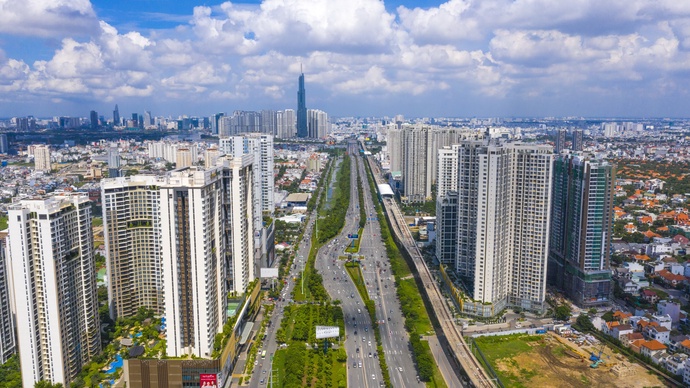
The COVID-19 pandemic has left Ho Chi Minh City’s residential leasing industry stagnant. While the number of tenants has dropped dramatically, many high- and mid-end apartments have stayed unoccupied.
An owner of a residential building on Ly Tu Trong in Central Business District 1, Ho Chi Minh City said her major customers were foreign experts from international companies, who were willing to pay the monthly rental of US$500 and up for a serviced apartment over a lease of six months to a year.
Since COVID-19 hit, she could not find any renters. Therefore, she opted to lease out the whole building.
Apartments located along the city’s ‘golden’ streets of Le Thanh Ton, Hai Ba Trung or Ly Tu Trong have also suffered the severe price slip.
From VND10-15 million ($436-654), the current prices are now set at VND6-12 million ($260-523) per apartment per month.
The same situation is happening in Thu Duc City’s Thao Dien area or Binh Thanh District’s Sai Gon Pearl where many expats live.
Many landlords have to lower rental prices and alter conditions to attract more customers. These changes have brought out insignificant improvements.
Since the beginning of COVID-19 in Vietnam last year, the high-end apartment leasing market in Ho Chi Minh City has recorded a drop of 30 percent.
According to analyst Dinh The Hien, the demand for affordable apartments rented at under VND10 million per month has stayed stable. These units are located mostly in outlying districts, focusing on young families.
Le Hoang Chau, chairman of the Ho Chi Minh City Real Estate Association, said this segment would continue growing as it met the real demand of domestic customers and was not affected by the pandemic.
Plus prices of affordable apartments do not rise much.
An apartment of 70 square meters in the border area between District 2 and District 9, which have now been merged into Thu Duc City, was leased at VND6 million per month in 2010 but it is now set at VND8 million ($348).
“It helps to keep both the market and set of customers stable,” explained Hien.
“The rise is equivalent to inflation, not too high, not too low, which offers a win-win situation to landlords and renters.”
|
|
| Blocks of apartments are seen in Ho Chi Minh City’s outlying area. Photo: Quang Dinh / Tuoi Tre |
High supply, low demand
An average of 44 percent of the apartments in a development are bought for living and 33 percent for leasing, according to a survey by a real estate exchange in Vietnam.
In 2019, the percentage of customers using the exchange to post rental information jumped 50 percent compared to the previous year.
The trend continued upward in 2020 while the number of customers declined due to economic harship.
The exchange’s representative said the market witnessed a drop since customers’ level of concern shrank.
Ho Chi Minh City-based real estate analysis firms share the same opinion.
This year’s first-quarter report on the real estate market composed by Colliers International in Vietnam points out the stagnancy of the serviced apartment segment in both Ho Chi Minh City and Hanoi.
In Ho Chi Minh City, the average rental expense for a first-tier apartment was $30.24 per square meter per month in the first three months of this year, dropping 22.5 percent compared to the end of 2020.
A second-tier apartment fetched $25.5 per square meter per month, down 18.85 percent compared to the previous quarter.
The company said the occupancy rate was not as high as 2019, staying at more than 60 percent for first-tier flats and 57 percent for second-tier units in Ho Chi Minh City.
David Jackson, CEO of Colliers International in Vietnam, told Tuoi Tre (Youth) newspaper that since the coronavirus pandemic erupted, big cities in Vietnam have reported higher percentages of unoccupied apartments due to the halt to international tourism and repatriation of expat communities.
Moreover, the further price reduction might create fiercer competition in the segment of serviced apartments in Vietnam.
Apartment rental prices rose regularly, especially units located near the city center where expats mostly work, prior to COVID-19, Jackson said.
Currently, apartment rents have declined 20 to 40 percent compared to those before the pandemic.
The price range would not recover overnight because of the unexpected developments of COVID-19, he added.
The executive noted that rental expenses of apartments in Vietnam remained lower than other developed countries, creating favorable conditions for highly paid expats to rent accommodations here.
|
|
| Ho Chi Minh City witnesses the rise of residential development projects. Photo: Quang Dinh / Tuoi Tre |
The ‘super profit’ period is over
Nguyen Tien Dung, chairman of Sai Gon Trien Vong Company, said the demand for apartment leasing was huge before 2019.
According to Dung, if one bought an apartment at the opening time, the value of that apartment would rise 20 percent after a year.
When it was rented, the investor would receive five percent of the apartment’s initial value a year, meaning 25 percent in total.
After the surge of COVID-19, people tend to invest more in real estate instead of retail or manufacturing, leading to a sharp rise in housing prices.
Meanwhile, Dung said the profits gained from high-end apartments were not that high. Before, each rental apartment generated a profit equivalent to eight to 10 percent of its value per year.
Now, the percentage is as small as four to five percent and it is harder to close a deal.
For example, an apartment bought at VND2-3 billion ($87,125-130,687) can be leased at VND8-15 million ($348-653) per month while a $175,000 apartment cannot possibly receive the monthly rent of VND15 million.
Previously, an investor could pay off a bank loan taken out to buy one apartment using the rent. Now, it is not that easy anymore.
According to analysts, the market of high-end apartments for rent reached its peak in 2016. At the time, the supply was low while foreign experts usually brought their whole families to Vietnam to live.
“In the past five years, expats have been allowed to buy houses in Vietnam so the supply of high-end apartments has risen with many services offered,” Dung remarked.
“The fall in demand is thus inevitable.”
Analyst Hien said 30 percent of apartments were bought as investments when a real estate project was released ten years ago.
For five years, the percentage of investors among real estate buyers has risen to 50 or even 70 percent.
Investment choices
According to Ho Chi Minh City Real Estate Association chairman Chau, now is not the right time to buy apartments for rent.
“The best scenario is to have your capital back within 12 years,” he said.
“Because of the rental price reduction, it will take 25 to 30 years for a landlord to recoup the initial investment, meaning it is economically inefficient.”
Hien emphasized the strategic choices of each investor in deciding whether to buy apartments for rent.
He explained that experienced investors might see more potential in land lots in outlying areas while naysayers might doubt development projects which are still on paper.
Therefore, those who have spare money and opt for legal safety and stable income might still choose to buy apartments for lease.
There is always a market for such units, he said.
Dung shared the opinion yet warned investors against hoping for high profits like before.
Experts point out two factors impacting the market.
First, the government prohibits residential apartments from being used as offices. Secondly, rental flats are taxed.
These factors force landlords to accept lower profits or raise rental expenses.
The latter is not likely to happen.


